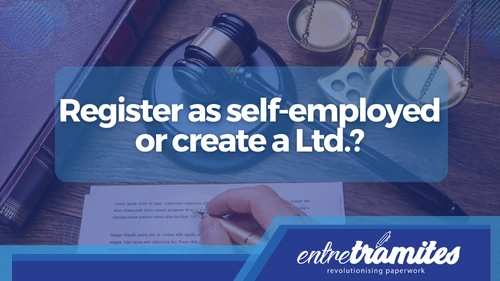Thinking whether it is better to set up as a Self-employed or Limited Company? How to know which one to choose according to the business idea you have and your personal needs?
Characteristics of the self-employed
A self-employed worker (“autónomo” in Spain) is a natural person who regularly, directly, on their own account and outside the scope of another person’s management and organization, carries out an economic or professional activity for profit that, the majority of times, does not include employees.
Its characteristics are:
- Full control of the company by the owner who directs its management.
- The legal personality of the company is the same as that of its owner (the entrepreneur), who is personally responsible for all the obligations incurred by the company.
- There is no differentiation between their commercial assets and civil assets.
- It does not require a prior incorporation process. The procedures start at the beginning of the business activity with the registration of the self-employed worker.
- The capital contribution to the company, both in quality and quantity, has no limit other than the will of the employer.
Characteristics of the Limited Company
A Limited Company (which in Spain is called “Sociedad Limitada” or SL) is a type of company of commercial nature in which liability is limited to the contributed capital.
The capital will be made up of the contributions of all the partners, divided into indivisible and cumulative shares.
Only assets or patrimonial rights capable of an economic valuation may be the object of a social contribution but in no case work or services.
Shares will not have an assets nature, they cannot be represented by means of titles, nor be called stocks, and their transmission must be represented in a public document.
Self-employed or Limited Company: Differences
Liability
While the individual entrepreneur is liable with their personal assets for debts owed to third parties in an unlimited manner, the liability of a Limited Company is restricted only to the assets contributed to the company.
However, it is possible to establish yourself as a Limited Liability Entrepreneur. Thus, you can avoid facing the acquired debts with your personal assets or, at least, with the house that you deliberately exclude.
Incorporation of the company
In the case of the self-employed, this procedure is much cheaper and easier than if you choose to create a Limited Company.
The initial capital investment is necessary for the incorporation of the SL, while it is not necessary for the self-employed worker.
The minimum share capital that must be provided for the incorporation of a Limited Company is 3,000 euros. E.g., the initial investment of a Public Limited Company is 60,000 euros.
At Entre Trámites we fully support you in this procedure, and we manage all the necessary paperwork for the incorporation of your company.
Formalities
The procedures for setting up a company are usually much longer and also entail a higher cost. The cost of registering as a self-employed is initially free, as long as you manage it directly, but the cost of setting up a company can be around 400 euros (or more) since it is necessary to pay the notary and lawyers’ fees, as well as the registration in the Mercantile Registry.
These costs only refer to the incorporation, but then you also have to face the Social Security contributions and it must be kept in mind that the self-incorporated (a self-employed worker who chose to create a commercial company) do not always have access to certain grants given by this institution.
Management costs
These costs are usually lower in the case of the self-employed because keeping their accounting is easier. In addition, it must be taken into account that currently the self-employed can apply a bonus to their Social Security contribution on certain occasions:
- 80% Bonus during the first year, if the self-employed worker chooses a contribution base higher than the minimum. Otherwise, they would have a monthly fee of 60 euros during the same period.
- Reduction equivalent to 50% of the quota during the 6 months following the initial period.
- 30% reduction for the following 3 months.
- Bonus equivalent to 30% for another 3 months.
However, as we said before, if you are a self-incorporated worker you cannot enjoy these bonuses and aid.
Taxes
The IVA management is really very similar, the difference lies in the Personal Income Tax (IRPF), which takes into account, in addition to the income obtained, the personal and family situation of each taxpayer, and, only natural persons like a self-employed worker have to file it. Companies have a tax of similar nature which is called the Corporate Tax.
This tax is levied on the same thing, so only one or the other can be applied.
Personal Income Tax is a proportional tax, so the higher the income, the higher the tax. In this case, it would be advisable to be self-employed or a company depending on the income forecast we have.
As a general rule, a percentage of 25% is applied to the Corporate Tax without taking into account that, on occasions, we can reduce this tax by means of a deduction.
On the contrary, the self-employed person can determine in a general way from which interval it is convenient for us to consider paying taxes by one or the other option taking into account the Personal Income Tax rates depending on the taxable base:
- Up to 12,450 euros: 19%
- From 12,451 euros to 20,200 euros: 24%
- From 20,201 euros to 35,200 euros: 30%
- From 35,201 euros to 60,000 euros: 37%
- From 60,001 euros: 45%
Taking these percentages into account, the Corporate Tax 25% rate is equal to a taxable income of 41,400 euros in the Income Tax Return, provided that the taxpayer is single and without any disability. From this taxable base, the exempt personal minimum would be subtracted, leaving an effective taxable base of 35,900 euros.
Taking this data into account, if the Personal Income Tax base is greater than 41,400 euros, it is beneficial to set up a Limited Company to pay less taxes without breaking the law. The higher that figure is, the more convenient it will be to create a commercial company.
However, this advantage is only good if part of the profits obtained are reinvested in the company.
Accounting
The accounting of a self-employed worker is much simpler than that of any company since it is reduced to the presentation of taxes and a few record books. Specifically, the self-employed must have:
- A record book of invoices issued
- A record book of invoices received and expenses
- An investment property record book (if any)
- A record book of intra-community operations (if any)
On the other hand, a limited company has to keep complete accounting and, in addition to taxes and record books, it will have to keep a daily book that allows it to generate the annual accounts, which are made up of a balance sheet, an annual report, and a profit and loss account.
Commercial image
A Limited Company offers a more solid and professional image.
Economic activity
If the activity to be carried out is considered a professional activity, it must be constituted as a professional company with all the characteristics that these entail.
Growth
A self-employed worker is certainly limited by its legal form, unlike a company.
A company provides greater security for customers but also gives access to external financing sources that a self-employed person cannot access.
Financing
Limited Companies have easier access to bank loans since the accounts of these businesses are clearer and more precise, so the fact of being an SL will always give greater financial security. However, what is fundamental in both cases is the endorsement or guarantee.
Being a Self-employed or a Limited Company has its pros and cons and will depend on the type of business you want to start or your needs. That is why we leave you an infographic with its advantages and disadvantages so that you can check them out in a summarized way.
If you have any doubts, or you need to incorporate your company, Entre Trámites can do it for you, contact us or check our services for the self-employed and SMEs.





